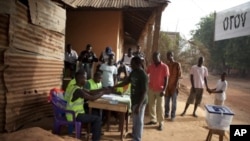The United Nations Integrated Peace-Building Office in Guinea-Bissau (UNIOGBIS) said it’s pleased with the peaceful conduct of Sunday’s presidential election in the West African nation. Citizens voted to elect a new president, who will succeed Malam Bacai Sanha who died in January.
UNIOGBIS spokesman Vladimir Monteiro said the electoral commission is constitutionally mandated to announce the final outcome of the vote within 10 days of the election.
“The election was held in a very peaceful manner,” said Monteiro. “In the morning, participation was relatively weak but, all day long, leaders of the electoral body encouraged the people to go and vote, and it seems that people listened and went to vote because the participation finally increased.”
Several international organizations, including the Economic Community of West African States (ECOWAS) and the UN Secretary General, Ban Ki Moon, called Bissau Guineans to peacefully vote in Sunday’s presidential election.
“All international partners are very pleased [with the election]. Appeals were made with this purpose and people [fully] participated. We may have more than 60 percent, which is very important. Our fear in the morning was to have less than that, but people participated,” said Monteiro.
Monteiro said electoral commission officials are likely to begin releasing results of Sunday’s election following the counting of the ballot.
“After the votes are counted, everything will be sent to the regional electoral body [office], then finally to the national headquarters to compile the figures. It’s only after this process will we finally have the real results regarding the next president of Guinea Bissau,” he said.
Nine candidates competed in Sunday’s vote to become the next president with a run-off slated for April, if none of the contestants garner over 50 percent of the total votes.
The front runners, analysts say, include Carlos Gomes Junior, who resigned as prime minister to run for president, and former president Kumba Yala, who was overthrown in a 2003 coup.
Monteiro cited one of the problems the electoral commission faced ahead of Sunday’s vote despite financial support from the international community.
“At least 10 percent of potential voters didn’t take part in this election because they were not enrolled, [since] there was not enough time to conduct a new registration process,” said Monteiro. “The electoral commission called for international support and the international partners supported Guinea Bissau $ 7.6 million to fund this current presidential election, but also the legislative vote due to take place in November.”
Monteiro said many citizens expressed hope that Sunday’s election will ensure the country’s peace and stability.
“We expect that this electoral process will lead to the stabilization of the country, definitely,” said Monteiro. “All voters interviewed by radio stations said they were voting because they want peace.”




